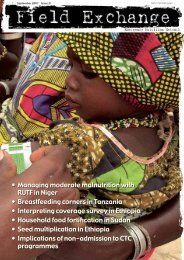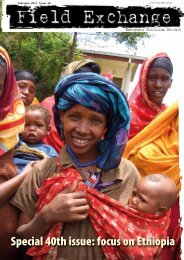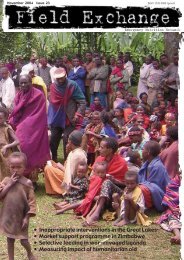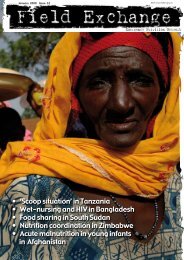<strong>Field</strong> ArticleEvaluationFigure 4Average household income and cases of diarrhoea by zoneUS $120100806040204540353025 % offamilies2015105Tim Hetherington/Network Photographers, 20010A B C D E F G H IZoneNo diarrhoeaAverage weekly income per family per area0A number of coping strategies were identifiedin focus group discussions and householdinterviews. These included:• buying food on credit• borrowing money from relatives• taking loans• sharing accommodation• renting out rooms in own house to others• reducing food diversity• women secretly saving small portions ofhusbands daily allowance• sale of jewellery• sale of assetsThough no conclusions can be drawn, thereis a striking correlation between the averageincome in a given area and the percentage offamilies who do not have children under fivewith diarrhoea (see figure 4).In summary, the main household constraintsidentified were financial insecurity andirregularity of income opportunities for themajority of the population, increasing insecurityin housing due to increased demand,dependence on the purchase of food, and theTable 1At-risk- Dispersed extremely vulnerableneighbourhoodsGozar Gah (District 7)Cement Khana (District 16)Deh Afghanan (District 2)Afshar Selo (District 5)Deh Dana (District 7)Shaharak Khurassan (District 16)Dewan Begi (District 5)22Recommended interventionsrelated to vulnerabilityassessment findingsZone A: District 1- Extremely high global vulnerabilityUrgent need for assistance to Saraji,Bagh Ali Mardan, Reka Khana, ShorBazar, and Kohi ChindawolSanitation: latrine rehabilitationHealth and hygiene educationIncome generation and skills trainingLobbying for housing securityZones D, H and G: Districts 7, 8, 9, 16and north of District 10- Outside master plan, overall lack ofservicesWater provisionSanitationHealth educationIncome generationLobbying for housing securityneed to borrow or take out loans to meet foodneeds.Conclusions and recommendationsAt the time of the assessment, the perceptionof most of those in Kabul was that theircurrent situation was positive with noticeableimprovements, especially in the provision ofservices. ACF’s recommendations arising fromthe assessment translate into geographic andsector specific interventions, first concentratingon the highly vulnerable zones – A, D, Hand G respectively, and at risk vulnerablehouseholds, with comprehensive programmesrelated to health, water and sanitation, incomegeneration and housing capacity (see table 1).The food security analysis component of theassessment highlighted a number of issues.Insecurity of regular income is the one mostsignificant threat to livelihoods in Kabul wherethe majority of the population has to purchasefood with no, or limited, alternative food sources.Unskilled workers (those working in construction,as porters, physical or manual labour)cannot depend on finding work on a regularbasis, especially in winter. Demand for labourfluctuates with the markets and seasons.Subsequently, they are the least able to copewhen shocks occur. Similarly, civil servantsreceive a modest salary and have been knownto go unpaid for months at a time. Efforts topromote regular income among vulnerablegroups should therefore focus on strengtheningexisting coping strategies.The main ACF recommendations for strengtheningfood security are:• Skills training for unskilled workers• Developing sustainable income-generatingactivities: stability of income over timeshould be favoured over one shot cashinputs that are limited in time• Developing sustainable income generatingactivities for women in the home• Identifying constraints to kitchengardening in the most vulnerable gozarsand developing kitchen garden projects inthese gozars• Supporting and encouraging education atall levels, for both boys and girlsEven though the influx of newcomers isreceding, Kabul remains a very attractive cityfor many, with people continuing to arrivefrom rural areas. The very high populationconcentrations justify continued support to thecity, with a specific focus on neighbourhoodsdeprived of sufficient services.For further information, contact: Lisa Ernoul,Head of Food Security Services, ACF Paris.Email: lernoul@actioncontrelafain.orgA 13 year old boy engaged in co-operative farming in DLessonsFrom SC UKEvaluationin DRCBy Anna Taylor,<strong>Nutrition</strong> Advisor, SC UKSummary ofinternal evaluationSave the Children UK (SC UK) beganimplementing emergency health and nutritioninterventions in eastern DemocraticRepublic of the Congo (DRC) in 1998, withinitial activities in North and South Kivu andNorth Katanga. The current programme ofwork began in June 2002, when the geographicalfocus was confined to a number ofhealth zones in North Kivu. The rationale forthis refocusing was to strengthen managementof the programme and better monitor
g in DRCits impact. An evaluation wascarried out in November 2003 andwas conducted as a participatoryprocess involving SC UK’s healthand nutrition team and governmentpartners.Information was gatheredthrough:• A review of programmedocuments• Key informant interviews• Group discussions with thehealth and nutrition programe• Observation visits anddiscussions with staff andpatients at nine SC UKsupported health/nutrition/cholera facilities, and twoother health centres in a totalof six health zones• A review of registers andpatient records at each of thefeeding centres visited• Group discussions withcommunity health volunteersinvolved in cholera preventionwork in Kyondo and nutritionactivities in Masisi (KibabiTherapeutic and SupplementaryFeeding Centres (TFC/SFC))Key findingsSince June 2002, SC UK’s emergencynutrition and healthprogramme in eastern DRC hasmade considerable progress inimplementation of planned activitiesand delivery of inputs/outputs. Box 1 details the mainprojectactivitiesof the programme.The programme has contributed to enhancedskills and capacity of government and NGO staff- especially in nutrition and cholera prevention,improved access to basic health and nutritionservices, and greater involvement of communities,including children, in health, nutrition andHIV/AIDS interventions. Implementation of theNational <strong>Nutrition</strong> Protocol is well underway.Routine monitoring reports suggest that therapeuticand supplementary feeding centres haveachieved Sphere Minimum Standards on severalkey indicators.On the other hand, the performance andquality of the work has been constrained by anumber of factors, not least the wide geographicalspread of the programme, engaged in adiverse range of activities and often lacking inclear focus. Difficulties working at a distancethrough poorly motivated government partnersand the absence of a ‘Protocol’ (memorandum ofunderstanding) with Provincial/Zonal HealthBureaux to delineate roles and responsibilitiesbetween SC UK and government have alsohindered progress. Other limitations have includedweak logistics support for the programmeactivities, reported problems with cash flows tocarry out the work, and weaknesses in managementand administration capacity internally andin government structures. Episodes of insecurityhave also hampered activities.The decision to work through existing structures,in partnership with local governmentauthorities, local NGOs, UN agencies and otherinternational agencies was appropriate for thecontext of eastern DRC. A significant strength ofthe programme approach has been the flexibilityto switch to and from an emergency mode, whilefollowing developmental principles - for example,the flexibility to open and close nutritioncentres according to findings of nutritionsurveys and local needs in specific localities. Theproject has adapted to the changing needs andpolicies of government as the national securityand political situation improved. It has alsoseized opportunities for working with andthrough local NGOs.The evaluation highlighted a number of gapsand weaknesses in project design. Key amongstthese were the following:• The large number of activities and widegeographical spread of the programme wereambitious, given SC UK’s understanding ofthe constraints of working through partnersin the context of chronic complexemergencies.• There has been insufficient understanding ofthe impact of training on the knowledge,skills, attitudes and practice of the healthstaff and supervisors in the workplace.• The critical question of the long-termrecurrent costs of maintaining and staffingthe newly constructed nutrition facilities(e.g. Kitatumba, Bulembo) does not appear tohave been considered in the project design.• The activities selected did not adequatelyaddress gender related issues or othernon-economic factors affecting decisionmaking processes at household level.• There has been lack of clarity over whetherthe intention was to try and reach as manycommunities and community basedorganisations (CBOs) as possible, or to usethe experience in a few selected areas as ademonstration for advocacy and influencingpurposes. Consequently, there is a risk ofallowing project staff to initiate activities inmore communities than can reasonably bemanaged.• The project plan to train families and supportstaff for integrated livelihood activities callsfor a very different set of skills andexperience than is usually found in anemergency health and nutrition team.• The appropriateness of the seeds and toolsdistribution component in collaboration withthe Food and Agricultural Organisation(FAO) is questionable. It appears that nostudies were conducted by FAO or others tofind out if seeds and tools were needed, ifpeople had land for cultivation, or indeed, ifseeds and tools were an appropriate meansof reducing the recurrence of malnutrition inthe DRC context.Lessons learnedAmongst the many lessons learnt, the followingwere key to nutrition programming:Arealistic assessment of the capacity, skills,time and resources required to implement aproject in a context such as eastern DRC is essentialat the design stage. A programme with aBox 1Evaluationwide geographical spread and many differentactivities and partners makes heavy demands onmanagement and logistics. Supervision andsupport carried out at a distance is costly, particularlyif it involves travel by air.The investment in time, skills and resources toensure a high quality of service at therapeuticand supplementary feeding centres should notbe under-estimated, particularly where servicesare implemented through local partners.A clear, comprehensive National <strong>Nutrition</strong>Protocol is an important tool for improving themanagement of severe malnutrition. However, asystem needs to be developed so that TFC staffcan provide feedback on the practical lessons,observations and issues from implementation ofthe Protocol. This information could be used toinform further refinement of the Protocol atnational level.Health officials/hospital directors need toappreciate the importance of ensuring that TFCsare staffed by teams of nutritionists and nursestrained and supervised to implement theNational <strong>Nutrition</strong> Protocol. The practice of rotatingnew nurses to a centre each month is not aneffective strategy. The management of severemalnutrition calls for a combination of nursingand nutrition skills, these skills can only be builtover a period of time working in feeding centres.When planning rehabilitation/constructionwork for health/nutrition facilities, it is importantto consider the full package of requirementsto meet international standards for emergencies.If it is not possible for the project to support allaspects of the package (e.g. water and sanitationfacilities, incinerators), steps should be taken totry and secure support from government,communities or other agencies.The recurrent cost implications of constructingnew buildings should be careful consideredbefore finalising plans. Temporary structures forfeeding centres may be a more cost effectiveoption.Prompt analysis of nutrition survey data isessential for mounting a timely response to highlevels of malnutrition. If there is limited capacitywithin the government system for this work, SCUK could offer technical support.For further information, contact Anna Taylor,<strong>Nutrition</strong> Advisor, SC UK, email:A.Taylor@scuk.org.ukMain project activities• Construction/rehabilitation of health and nutrition facilities at selected sites• Provision of essential equipment and recurrent supplies (medical/non-medical)• Training and support to health staff on topics such as nutrition, choleraprevention/management, disease surveillance, malaria, rational drugprescribing, vaccination, supervision systems and PRA/PLA techniques• Facilitating vaccination activities in areas where coverage rates are low• Strengthening early warning systems for communicable diseases• Awareness raising on HIV/AIDS among youth/school children• Conducting nutrition surveys/screening for malnutrition, and establishing,supporting and closing feeding centres• Distribution of seeds and tools provided by the Food and AgriculturalOrganisation (FAO) and training local agronomists and community volunteersin improved agricultural techniques• Studies to get a better understanding of the health/nutrition situation andneeds of communities• Pilot activities such as operational research on community financingmechanisms,community nutrition and early warning systems to test outapproaches for scaling up or replication by others• Documentation and dissemination of lessons learned and advocacy23
















